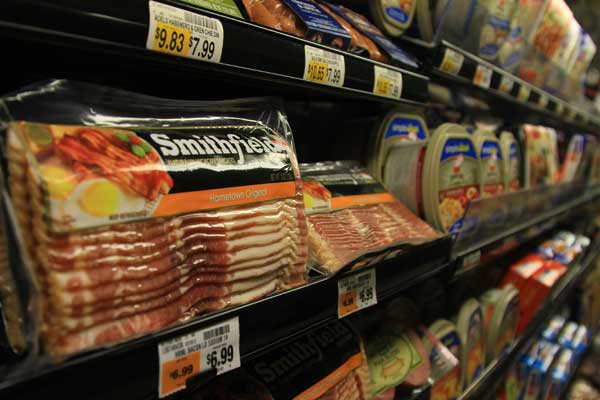Smithfield deal 'great' for US shareholders: CEO
Calling it a "great transaction" for shareholders, US farmers and agriculture, Smithfield Foods Inc. CEO Larry Pope announced shareholders had approved the pork giant's acquisition by Shuanghui International Holdings Ltd., the biggest Chinese takeover ever of a US company.
"The partnership is all about growth, and about doing more business at home and abroad," Pope said Tuesday about the $4.7 billion acquisition, and he promised to keep things "business as usual — only better" at Smithfield.
 |
|
A customer selects a Smithfield product in a supermarket in midtown Manhattan on Tuesday. Bai Jie for China Daily |
More than 96 percent of the votes cast backed the transaction, representing about 76 percent of the company's outstanding stock, Smithfield said. The acquisition, valued at $7.1 billion including debt, is expected to formally close by Thursday, after which the Virginia-based company's New York Stock Exchange-listed shares will cease to trade publicly, it said. The world's largest pork processor will then begin to operate as a wholly owned Shuanghui unit.
Shuanghui, China's biggest meat processor, will pay Smithfield shareholders $34 cash for each share held, a 31 percent premium to the price when the deal was announced in May.
Proxy advisory firms Glass Lewis & Co and Institutional Shareholder Services had recommended that Smithfield shareholders back the deal.
Unhappy with the offer, New York hedge fund Starboard Value LP, a 5.7 percent Smithfield stakeholder, had said it would vote against the transaction if it could not find a more lucrative alternative offer, but it reversed course last week and said it would vote for the acquisition.
The proposed acquisition sparked debate over the deal's implications for US food safety. Both companies asserted the merger was driven by growing pork demand in China and not a strategy to export pork to the US. The merger failed to raise antitrust concerns because it doesn't give Smithfield a larger share of the US pork market.
Two weeks ago, the Committee on Foreign Investment in the United States (CFIUS), a collection of federal agencies that reviews foreign purchases for their national-security implications, approved the transaction at the end of an extended 45-day investigation, clearing the way for the shareholder vote.

























